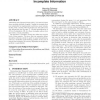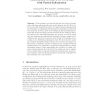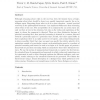237 search results - page 22 / 48 » On the decidability and complexity of reasoning about only k... |
FOSSACS
2005
Springer
14 years 27 days ago
2005
Springer
Separation logic is a spatial logic for reasoning locally about heap structures. A decidable fragment of its assertion language was presented in [1], based on a bounded model prope...
ATAL
2010
Springer
13 years 8 months ago
2010
Springer
Alternating-time Temporal Logic (ATL) [1] is used to reason about strategic abilities of agents. Aiming at strategies that can realistically be implemented in software, many varia...
COCOON
2005
Springer
14 years 28 days ago
2005
Springer
It has recently been observed that the node degrees of many real-world large-scale networks, such as the Internet and the Web, follow a power law distributions. Since the classical...
AI
2007
Springer
13 years 7 months ago
2007
Springer
Although reasoning about what is the case has been the historic focus of logic, reasoning about what should be done is an equally important capacity for an intelligent agent. Reas...
JANCL
2007
13 years 7 months ago
2007
Qualitative coalitional games (QCGs) were introduced as abstract formal models of goal-oriented cooperative systems. A QCG is a game in which each agent is assumed to have some goa...



